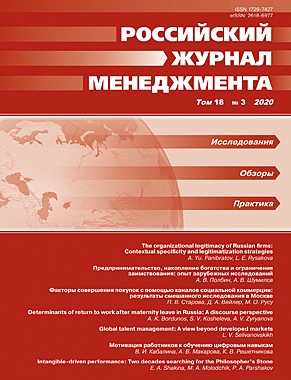Global talent management: A view beyond developed markets
DOI:
https://doi.org/10.21638/spbu18.2020.305Аннотация
This study aims to identify the main drivers, activity domains and outcomes of global talent management (GTM) in emerging market organizations. Through a structured keyword search and subsequent elimination of papers, 27 top peer-reviewed journal publications (out of 137 articles on talent management) are selected and thoroughly analyzed using mixed research techniques. Using VOSviewer software, I identify the four major clusters in GTM literature: TM in EMs, global talent mobility, TM in multinational corporations, and human resource management in a “global war for talent” context. I further conduct a structured content-analysis-based literature analysis and provide a much-needed overview of the underlying organization theories used in previous EM research to explain the GTM phenomenon. I additionally reveal the key GTM system components and determine the main demand-supply factors and outcomes of GTM implementation. Lastly, based on the study’s findings and subsequent discussions, I offer insights into future research avenues.
Ключевые слова:
global talent management, emerging markets, structured literature review, bibliometric analysis, content analysis
Скачивания
Библиографические ссылки
REFERENCES
Загрузки
Опубликован
Как цитировать
Выпуск
Раздел
Лицензия
Статьи журнала «Российский журнал менеджмента» находятся в открытом доступе и распространяются в соответствии с условиями Лицензионного Договора с Санкт-Петербургским государственным университетом, который бесплатно предоставляет авторам неограниченное распространение и самостоятельное архивирование.





